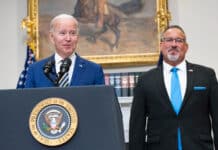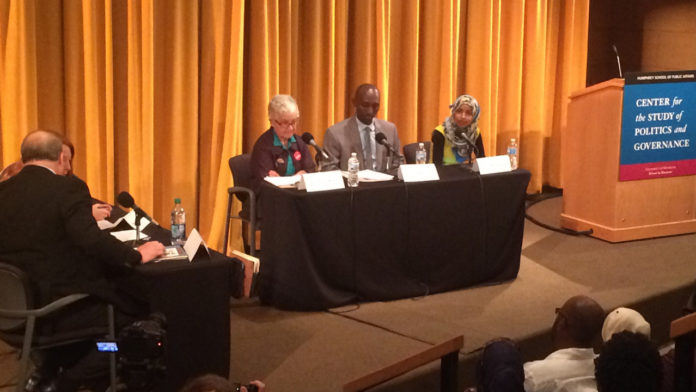Cowles Auditorium was filled to capacity Monday night as it hosted Rep. Phyllis Kahn, Mohamud Noor, and Ilhan Omar, each vying to win the DFL primary for House Seat 60B.
The 250 people gathered in the University of Minnesota’s Humphrey School of Public Affairs listened to the incumbent Kahn, who has held her office since 1972, and her two challengers debate issues ranging from the minimum wage and income inequality, to Sunday liquor sales and policing practices.
With a Minneapolis vote on a $15 an hour minimum wage looming, moderators Professor Lawrence Jacobs of the Humphrey School of Public Affairs and Briana Bierschbach of MinnPost made this a focal point. All three candidates supported the idea of a large hike in the minimum wage, but to varying degrees. The candidates were also of varying levels of consistency in regards to business regulations.
“What I am proposing is a rise, in giving a livable wage of $15 and providing flexible and fair scheduling and getting paid sick leave,” Omar said, “And making sure that our small businesses are able to employ more young people.”
Omar described herself as one of the first supporters of the push for a $15 an hour minimum wage in Minneapolis, even backing the campaign financially. She was far from the most aggressive on this issue.
“$15 is not enough,” Noor said, “If you want to rent a three bedroom it will cost you more than $2,000 in today’s economy. Would you be paying for rent or childcare, even with $15? It’s not enough.”
Kahn supported the $15 minimum wage as well, but was more keen to allow the decision to devolve to local control as an experiment.
The surprisingly contentious issue of the debate was Sunday liquor sales. Omar emphasized that students were the primary stakeholders in this issue, and challenged Kahn on her lack of support on the issue. Kahn was adamant that she’s one of the first to introduce legislation to repeal the ban.
“If someone wants to have fun on Sunday, why would we want to stop them?” Noor said.
With the police involved deaths of Philando Castile and Jamar Clark in Minneapolis in the past year, much of the debate centered on how to improve law enforcement practices.
“I want to reaffirm that Black Lives Matter,” Omar led with when asked about the issue.
The candidates agreed that police training pertaining to racial issues needed to start earlier in a police officer’s career.
“When police are engaging in a manner where they have an explicit bias and they are fearing the public that they are supposed to protect, then our society is unable to thrive the way it’s supposed to,” Omar said.
All candidates agreed that body camera data from officers should be made public to some degree. Omar had some reservations about making all the data public as she had concerns about protecting victims.
Otherwise the candidates were much aligned on issues of public transportation and taxation.
“We’re all liberals,” Kahn said, “I’m a tax and spend liberal.”












